As expected and predicted, Chinese car giant BYD has beaten Tesla for a second straight year as the world’s top seller of electric cars. The sales figures for the final quarter of 2023 showed that the American company produced 494,989 vehicles (delivering only 484,507). However, for the first time, the Chinese company sold 526,409 vehicles (excluding hybrid and commercial vehicles such as buses).
Overall, Tesla produced a total of 1,845,985 vehicles in 2023 – up 37% from the previous year. But BYD sold a whopping 3,024,417 vehicles last year – 62% more than financial year 2022. Nevertheless, while total production surpassed Tesla, BYD manufactured 1.6 million battery-only passenger cars and 1.4 million hybrids, meaning Tesla is still the top for battery-only production.
Billionaire Elon Musk’s automaker only sells purely battery-powered cars or electric vehicles (EVs). Anyway, BYD (Build Your Dream) actually sold 242,766 pure EVs in export markets during 2023 alone. That’s a year-on-year increase of a staggering 334%. Not bad for a Chinese electric car manufacturer which began its life in 1995 as a battery manufacturer.
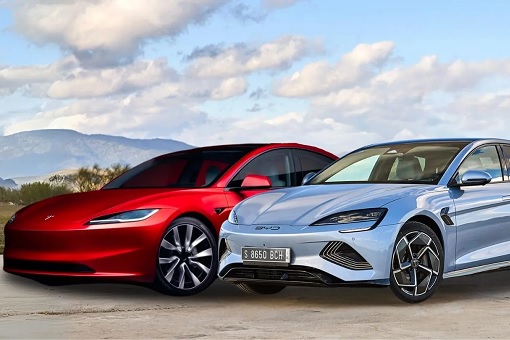
In 2022, BYD sold a total of 1.86 million electric vehicles – more than the previous 4 years combined (it sold only 593,745 cars in 2021). Effectively, the company captured 30% market share of all new energy vehicle sales in China in 2022. That year, the Chinese automaker reported a net income of 16.6 billion Yuan (US$2.4 billion) – an impressive jump of 446%.
The Chinese brand, which only started manufacturing cars in 2003, stopped producing purely gasoline and diesel-powered cars in March 2022. From the third-largest automaker in 2016, BYD became the world’s largest EV manufacturer in 2022 when it outsold the German brand Volkswagen in sales on the Chinese market in November 2022 and surpassed Tesla’s 1.31 million electric vehicles.
China itself is an extremely competitive market, even among Chinese manufacturers. Even smartphone maker Xiaomi last week revealed its plan to launch an EV to compete with Porsche and Tesla. Huawei’s new energy vehicle brand – Aito – said on Monday that orders for its M9 SUV have surpassed 30,000 within 7 days since its launch. Aito delivered 94,380 cars in 2023 – up from 75,000 cars in 2022.
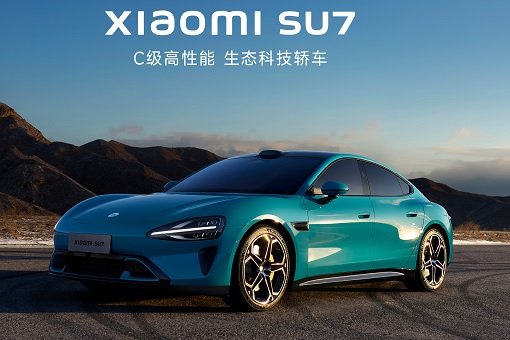
Geely-backed Zeekr said it started Monday to deliver its latest model, the 007 electric sedan, as the company’s overall deliveries rose by 65% in 2023 to 118,685. Nio said it delivered 160,038 cars in 2023, up by nearly 31% year on year. Li Auto is set to launch its first purely battery-powered vehicle, MEGA, on March 1. Another player, Xpeng, launched its X9 MPV on Monday.
As brands like Nio and BYD push into markets outside China, especially Europe, they are introducing incredibly cheap electric vehicles. At the Shanghai Motor Show in March 2023, BYD Auto Co unveiled the “Seagull” – the cheapest EV (electric vehicle) – at just US$11,000 (£8,855; RM48,813) a pop. Seagull was BYD first model to use lithium-free and cobalt-free sodium-ion battery.
The Shenzhen-based BYD competes aggressively against Tesla on price inside China as well as in Europe. To boost sales, the automaker agreed to pay 666 Yuan (US$93.17) per car to the dealers if they achieved their sales targets in 2023. The company has been rapidly expanding its sales network in China via dealerships, especially in lower-tier Chinese cities.
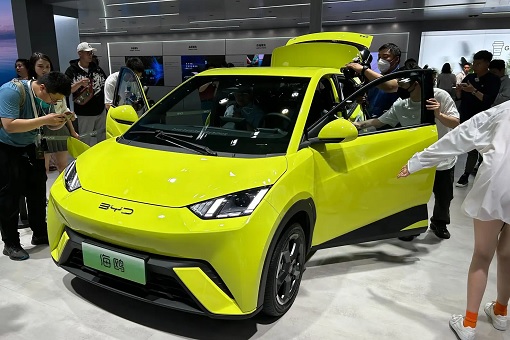
BYD has more than 3,400 stores in China selling its Dynasty and Ocean series of cars, the highest among all brands. More importantly, BYD has a structural advantage such as the very strong support for electric vehicles by the Chinese government. Generous government subsidies have often been used as an excuse by foreign countries to slam the unfair competitive edge.
However, China is also leading the battery arms race – battery maker CATL controls about 30% of the world’s EV battery market. Chinese refineries supplied 85% of the world’s battery-ready cobalt, which comes from the Democratic Republic of the Congo (DRC), where almost 70% of the mining sector is dominated by Chinese companies, controlling the various stages of the supply chain – from mining and refining to final assembly.
Recognizing battery cells – which make up 40% of the cost of EV – as the most important part of an electric vehicle, China has been controlling all the necessary materials in battery manufacturing. Without Chinese-made batteries and the related minerals refined and mined by Chinese companies, Tesla itself would not have become the US$1 trillion company and BYD could not produce 1.86 million EVs.
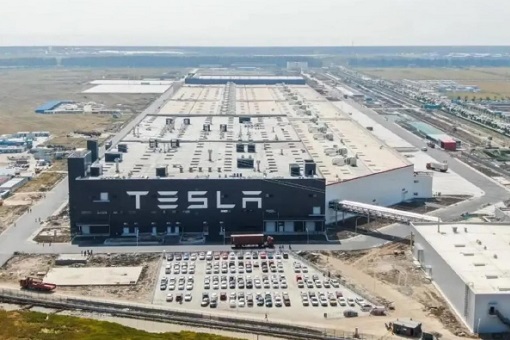
In April 2023, Elon Musk said Tesla was expanding in China and will build a new factory to make its large-scale “Megapack” batteries. As the biggest producer of batteries, China is an indispensable part of Tesla’s supply chain. China has created an ecosystem that tightly integrates important American technology companies like Tesla, making it difficult to quit the country.
Ford Motors also announced that its licensing CATL’s lithium-iron-phosphate technology for use in a new battery plant it will set up in the US state of Michigan. By now, when other countries realized the importance of battery materials and the potential of EVs, China has already established its head start not only in supply chain, but also EV batteries that are cheap and can be produced at industrial scale.
It’s hard to see how China’s battery leadership can be challenged. According to the Economist, by 2030, China is estimated to possess 69% of global battery-production, enough to make 90 million cars annually. That’s a huge dominance compared to the combined Europe and the U.S.’ global capacity of 14% each, which could power 19 million vehicles each in a year.
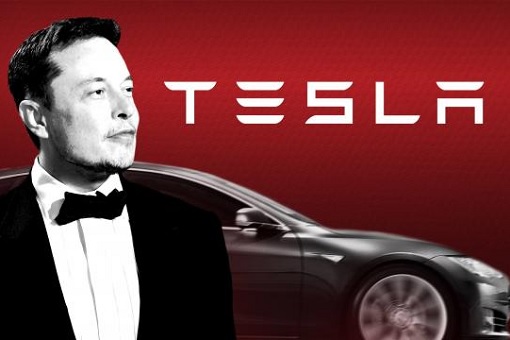
Despite the screams of China’s unfair subsidies, Tesla itself enjoys the U.S.’ unfair 27.5% auto tariffs slapped on China, without which the Chinese EVs would have drown Tesla in its own backyard. Last month, President Biden introduced new protectionist measures to punish EV companies with Chinese links through his Inflation Reduction Act. Washington was also looking at raising tariffs on Chinese EVs.
In December, BYD, which sells five models in Europe and has plans to launch three more this year, announced plans to build a new factory in Hungary. European manufacturers are expected to suffer over US$7 billion yearly in lost profits by 2030. Already, Chinese electric vehicles have grown by a jaw-dropping 851% over the past 3 years. Renault’s CEO recently said that Chinese EV makers are “a generation ahead of us.”
BYD’s Han sedan retails in China for about US$32,000, almost US$18,000 cheaper than Tesla’s entry-level Model Y. In gridlocked cities where customers rarely get to speed like Formula-1 drivers, affordability is one of the top priorities. Lower price means value for money to many consumers. But price isn’t the only factor. BYD also offers more models than Tesla.
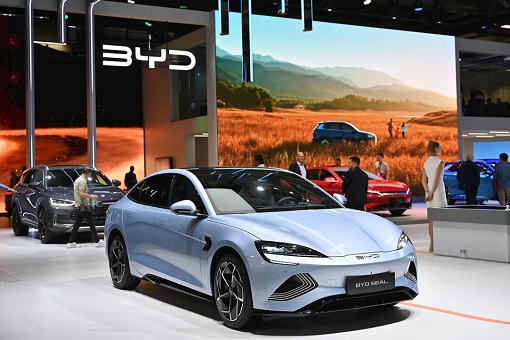
Warren Buffett-backed BYD is known for its models based on sea-animals (Seal and Dolphin), Chinese imperial dynasties (Han, Tang, Yuan and Song) and warships (Frigate and Destroyer). But not many know that the company also has high-end vehicles under its Denza (a joint-venture with Mercedes Benz), Yangwang (proprietary IWD technology) and Fangchengbao brands.
As of November 2023, Tesla offers six vehicle models – Model S, Model X, Model 3, Model Y, Tesla Semi, and Cybertruck. In comparison, BYD has more than two dozen models to choose from. In fact, BYD has applied for over 13,000 patents between 2003 and 2022 while Tesla applied for a mere 863 patents over the same time period. More than half of all BYD’s patents are related to batteries.
With 16 times more patents than Tesla, BYD is able to use battery packs it develops in-house, rather than having to turn to third-party suppliers. This has positioned BYD as a leader in the development and manufacture of lithium-ion batteries with iron phosphate cathodes, which are more affordable than the ternary lithium batteries utilizing nickel and cobalt from their Korean counterparts.
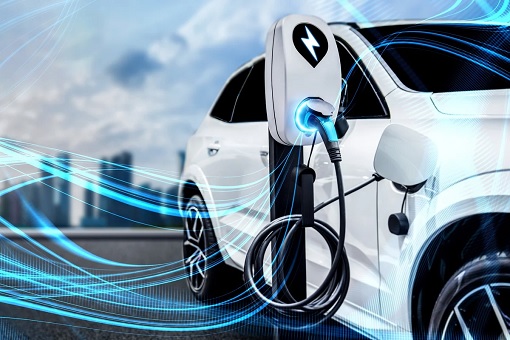
Yes, not many know that BYD was a mobile phone battery manufacturer for companies such as Motorola. That gives the company an advantage when it became an EV company. It also produces most of its parts, therefore, giving it the supply chain dominance. So, it’s not true that BYD’s success was due entirely to government support or good luck.
After all, it was Musk who laughed at BYD in a Bloomberg interview in 2011 – “Have you seen their car? I don’t think they make a good product”. One can always argue that if the California government didn’t heavily subsidise zero-emission vehicles, Tesla may not exist today because it would have had made “zero profits” for the first 10 years.
Other Articles That May Interest You …
- Sodium-Ion Battery – How China Supercharge Rechargeable Batteries To Dominate The Next Big Technology
- Electric Car As Cheap As $11,000 – How China Beats The U.S. In Electric Vehicles & Leaves Global Brands In The Dust
- Volvo Will Sell Only Electric Cars By 2030 – And You Can Only Buy It Online
- Learn From China – Mahathir Has To Dismantle Discrimination & Racist Economic Policy First
- If Proton Has The Quality Of Volkswagen Or Toyota, People Will Not Dump The National Cars
- Third National Car, The Unfinished Business – Why Mahathir Should Wake Up & Stop Hallucinating
- China Geely Introduces Meritocracy – But Handicapped Proton “Bumiputeras” Aren’t Happy
- 80% Cheaper To Take Robo-Taxi – The Next Car You Buy Could Be Your Last
- Delivering 310 Miles (499-KM) – Tesla Model 3 Could Be As Successful As iPhone
- Australia Will Get World’s Largest Battery – Free – If Musk Fails Within 100 Days
- Here’s Why Zuckerberg Was Furious When SpaceX Rocket Exploded

|
|
January 4th, 2024 by financetwitter
|


|

|

|

|

|

|




























Comments
Add your comment now.
Leave a Reply